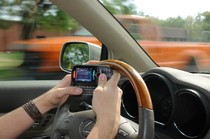
Greater Hamilton Safety Council
400 N Erie Blvd.
Hamilton, OH 45011
Phone: (513) 896-5333
Fax: (513) 896-5334
SAVE THE DATE!
JUNE 22, 2024 BOB GENTRY GOLF SCRAMBLE. ALL PROCEEDS GO TO OUR SAFETY TOWN PROGRAM THAT IS FREE TO ALL CHILDREN. SEE REGISTRATION FORM AND INFO BELOW
Adobe Acrobat document [328.0 KB]
Are Your Employees Distracted Drivers?
Cell phone usage may be just one indication of a “distracted driver personality type”
The American Society of Safety Engineers (ASSE) states that transportation incidents are the number one cause of on-the-job deaths. To reduce accidents and fatalities on the roadways and to guard against distracted drivers, the ASSE recommends companies develop or upgrade their employee driving guidelines.
Recent information indicates that employers need to be concerned: People who use cell phones when driving are more likely to be distracted from the road, even when they are not talking on a phone. Data indicates that there may be a “distracted-driver” personality type. The Response Insurance National Driving Distractions Survey compared attentiveness of cell phone users with non-users when not talking on the phone. “From the time we issued our first survey, we said that cell phones we only one part of a societal trend of multi-tasking while driving and general lack of attention to the road,” said Mory Katz, chairman of Response Insurance. There could be a chronic inattentiveness problem for a specific group of drivers. More than cell phone use, the larger issue might be concentrating on a larger problem: sensitizing drivers to behavior that causes inattentiveness. Additional research and much more driver education will be necessary.
|
Distracted Drivers
Results* show
those who use cell phones while driving are more likely to be distracted, even when not talking on the phone. Drivers who talk on cell phones are:
Results from the Response Insurance National Driving Distraction Survey |

